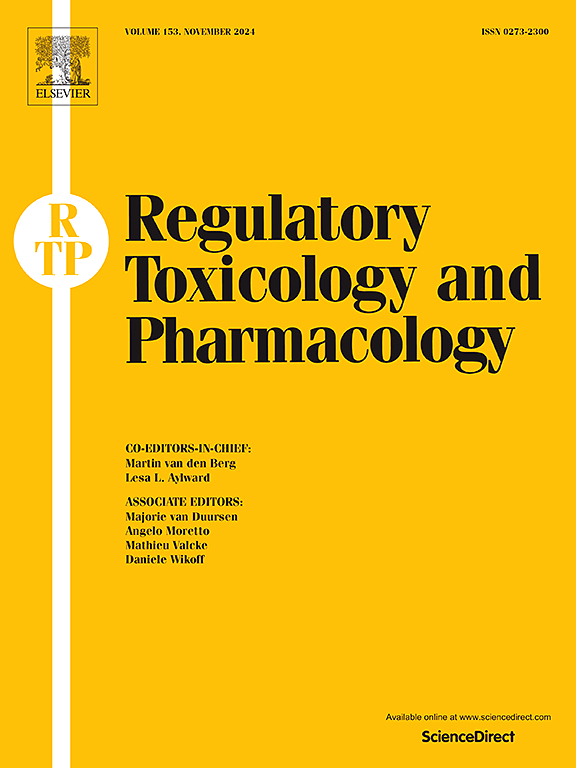An analysis of the use of historical control data in the assessment of regulatory pesticide toxicity studies
IF 3
4区 医学
Q1 MEDICINE, LEGAL
引用次数: 0
Abstract
The concurrent control group is the most important reference for the interpretation of toxicity studies. However, pooled information on control animals from independent studies, i.e., historical control data (HCD), is also used for the interpretation of results. Currently, an overview on actual HCD use in regulatory toxicology is lacking. Therefore, we evaluated the HCD use of the Joint FAO/WHO Meeting on Pesticide Residues from 2004 to 2021 and compared it with recommendations in regulatory guidelines and in the literature. We found that HCD was used routinely and exclusively to avoid potential false positive decisions regarding the treatment-relatedness of effects, mostly using the HCD range, i.e., the most extreme values, as a benchmark. HCD were not used to avoid potential false negative decisions or for quality control of the index study. The central assumption of the HCD use, namely that the HCD and control group of the index study follow the same underlying distribution because they are samples of the same data generation process, was not investigated, although numerous factors potentially contribute to effect variation between the different control groups pooled in the HCD. We recommend that the existing guidelines be revised to improve the robustness and transparency of toxicological assessments.
分析历史控制数据在农药毒性监管研究评估中的应用。
同期对照组是解释毒性研究的最重要参考。不过,来自独立研究的对照动物的汇总信息,即历史对照数据(HCD),也可用于解释研究结果。目前,监管毒理学中实际使用 HCD 的情况尚缺乏综述。因此,我们评估了 2004 年至 2021 年粮农组织/世卫组织农药残留联席会议使用 HCD 的情况,并将其与监管指南和文献中的建议进行了比较。我们发现,HCD 的常规使用完全是为了避免在影响的处理相关性方面可能出现的假阳性判定,大多使用 HCD 范围(即最极端值)作为基准。HCD 不用于避免潜在的假阴性判定,也不用于指标研究的质量控制。使用 HCD 的核心假设,即指数研究中的 HCD 和对照组遵循相同的基本分布,因为它们是同一数据生成过程中的样本,并没有进行调查,尽管有许多因素可能导致 HCD 中汇集的不同对照组之间的效应差异。我们建议修订现有指南,以提高毒理学评估的稳健性和透明度。
本文章由计算机程序翻译,如有差异,请以英文原文为准。
求助全文
约1分钟内获得全文
求助全文
来源期刊
CiteScore
6.70
自引率
8.80%
发文量
147
审稿时长
58 days
期刊介绍:
Regulatory Toxicology and Pharmacology publishes peer reviewed articles that involve the generation, evaluation, and interpretation of experimental animal and human data that are of direct importance and relevance for regulatory authorities with respect to toxicological and pharmacological regulations in society. All peer-reviewed articles that are published should be devoted to improve the protection of human health and environment. Reviews and discussions are welcomed that address legal and/or regulatory decisions with respect to risk assessment and management of toxicological and pharmacological compounds on a scientific basis. It addresses an international readership of scientists, risk assessors and managers, and other professionals active in the field of human and environmental health.
Types of peer-reviewed articles published:
-Original research articles of relevance for regulatory aspects covering aspects including, but not limited to:
1.Factors influencing human sensitivity
2.Exposure science related to risk assessment
3.Alternative toxicological test methods
4.Frameworks for evaluation and integration of data in regulatory evaluations
5.Harmonization across regulatory agencies
6.Read-across methods and evaluations
-Contemporary Reviews on policy related Research issues
-Letters to the Editor
-Guest Editorials (by Invitation)

 求助内容:
求助内容: 应助结果提醒方式:
应助结果提醒方式:


